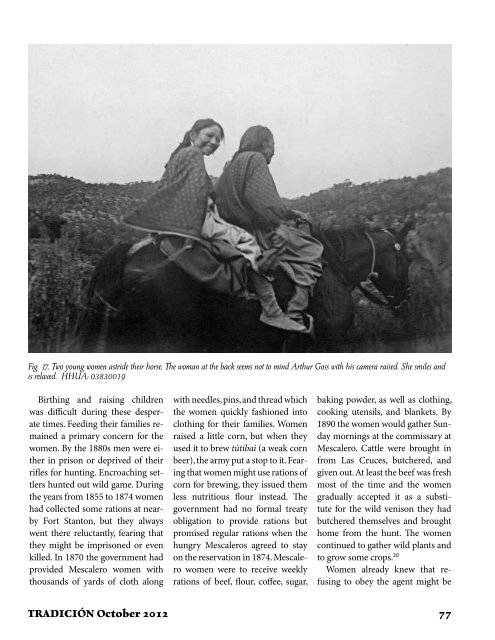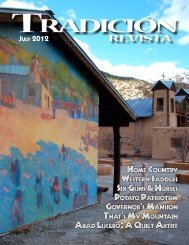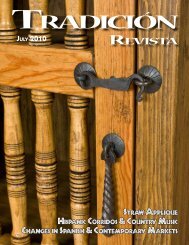tradicion revista fall 2012 - LPD Press & Rio Grande Books
tradicion revista fall 2012 - LPD Press & Rio Grande Books
tradicion revista fall 2012 - LPD Press & Rio Grande Books
Create successful ePaper yourself
Turn your PDF publications into a flip-book with our unique Google optimized e-Paper software.
Fig. 17. Two young women astride their horse. The woman at the back seems not to mind Arthur Goss with his camera raised. She smiles and<br />
is relaxed. HHUA: 03830019<br />
Birthing and raising children<br />
was difficult during these desperate<br />
times. Feeding their families remained<br />
a primary concern for the<br />
women. By the 1880s men were either<br />
in prison or deprived of their<br />
rifles for hunting. Encroaching settlers<br />
hunted out wild game. During<br />
the years from 1855 to 1874 women<br />
had collected some rations at nearby<br />
Fort Stanton, but they always<br />
went there reluctantly, fearing that<br />
they might be imprisoned or even<br />
killed. In 1870 the government had<br />
provided Mescalero women with<br />
thousands of yards of cloth along<br />
with needles, pins, and thread which<br />
the women quickly fashioned into<br />
clothing for their families. Women<br />
raised a little corn, but when they<br />
used it to brew tútibai (a weak corn<br />
beer), the army put a stop to it. Fearing<br />
that women might use rations of<br />
corn for brewing, they issued them<br />
less nutritious flour instead. The<br />
government had no formal treaty<br />
obligation to provide rations but<br />
promised regular rations when the<br />
hungry Mescaleros agreed to stay<br />
on the reservation in 1874. Mescalero<br />
women were to receive weekly<br />
rations of beef, flour, coffee, sugar,<br />
baking powder, as well as clothing,<br />
cooking utensils, and blankets. By<br />
1890 the women would gather Sunday<br />
mornings at the commissary at<br />
Mescalero. Cattle were brought in<br />
from Las Cruces, butchered, and<br />
given out. At least the beef was fresh<br />
most of the time and the women<br />
gradually accepted it as a substitute<br />
for the wild venison they had<br />
butchered themselves and brought<br />
home from the hunt. The women<br />
continued to gather wild plants and<br />
to grow some crops. 20<br />
Women already knew that refusing<br />
to obey the agent might be<br />
TRADICIÓN October <strong>2012</strong> 77




